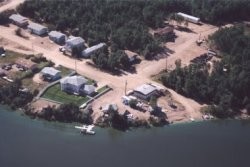By: Nick Pearce, Local Journalism Initiative Reporter, The StarPhoenix
Muskwa Lake Wellness Camp in Pinehouse hopes to translate decades of experience into change for Indigenous communities in Saskatchewan.
Kimberly Smith, health and wellness manager of Kineepik Métis Local 9, says a new four-year study by University of Saskatchewan researchers will help demonstrate the value of land-based treatment for addictions and mental health.
“It gives us the (evidence) that we need to show that stuff like this works across the province,” she said.
“It’s not just taking information or studies from somewhere, but really looking at something that’s been grassroots and locally operated for all these years.”
The camp provides land-based health intervention to address alcoholism, suicide and overdose deaths in northern Saskatchewan communities.
The province has given the camp a grant of $337,000, which will be partly used to winterize the operation.
That will bring the number of people it serves each year to 90 from its current capacity of 60, in 15-person cohorts, a news release said.
Smith said it’s the first provincial funding the centre has received in its roughly 40 years of operation.
Previously, the sole funders were the Northern Village of Pinehouse, Métis Nation—Saskatchewan and private donations.
It’s important that community members lead these efforts, instead of outside programs parachuted into a local context, Smith said.
“It’s giving power back to Indigenous people, that we are OK to be who we are — not always put aside or waiting for some professional to come in.
“We have the answers and we have the power within our communities.”
U of S researcher Dr. Malcolm King is the principal investigator of the research project, funded by the Canadian Institutes of Health Research.
He plans to study what works, what doesn’t and what can be improved.
Having more evidence will make it easier for programs like Muskwa Lake Wellness Camp to access provincial funding, he said.
“Like it or not, that’s how politicians think. They don’t want to put funding into programs that don’t work.”
The project is in the planning stages and will begin in 2022, he said.
Until then, Smith said the local roots of the program allow the camp to “put people over policy” and be flexible enough to respond to challenges in real time.
These services should be available more broadly in northern communities, and if any other communities adopt the model, she wants to support them, she said.
“Because if we can do it, other communities can follow in our footsteps. And hopefully, they don’t have to wait 40 years for funding.”
(Photo of Pinehouse.)
